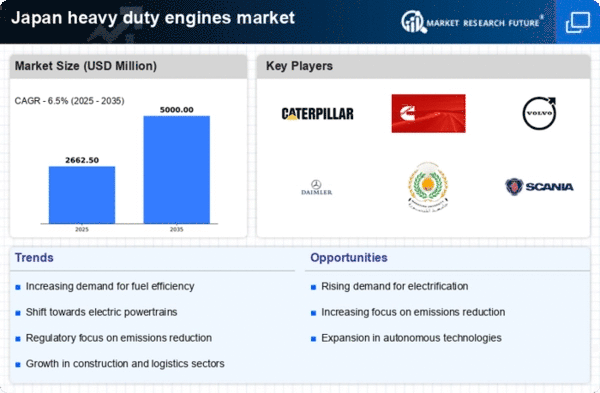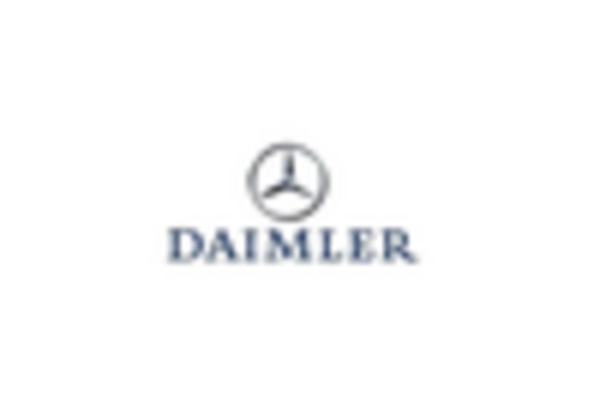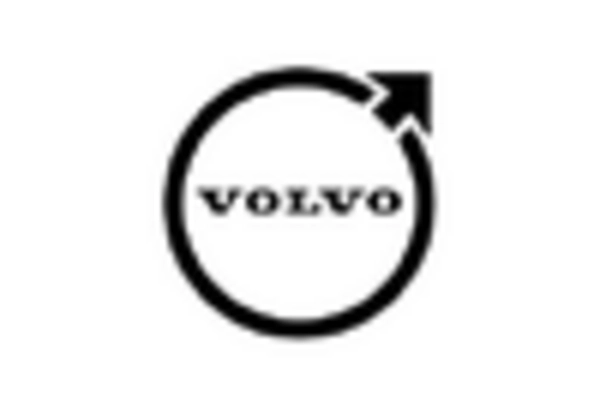Regulatory Compliance Pressure
The heavy duty engines market in Japan faces increasing pressure from regulatory bodies to comply with stringent emissions standards. The Japanese government has implemented various regulations aimed at reducing greenhouse gas emissions, which directly impacts the design and manufacturing processes of heavy duty engines. As a result, manufacturers are compelled to invest in cleaner technologies and alternative fuels. This shift not only enhances the environmental sustainability of the heavy duty-engines market but also drives innovation in engine design. The market is projected to grow as companies adapt to these regulations, with an estimated increase in compliance-related expenditures reaching 15% by 2026. Consequently, the focus on regulatory compliance is a significant driver influencing the heavy duty-engines market in Japan.
Rising Demand for Efficient Logistics
The heavy duty engines market in Japan is significantly influenced by the rising demand for efficient logistics and transportation solutions. As e-commerce continues to expand, the need for reliable and efficient heavy duty vehicles has surged. This trend is reflected in the logistics sector, which is expected to grow by approximately 10% annually over the next five years. Companies are increasingly seeking heavy duty engines that offer improved fuel efficiency and lower operational costs. This demand drives manufacturers to innovate and enhance engine performance, thereby contributing to the overall growth of the heavy duty-engines market. The emphasis on logistics efficiency is likely to remain a key driver, shaping the future landscape of the market.
Investment in Renewable Energy Sources
Investment in renewable energy sources is becoming a significant driver for the heavy duty engines market in Japan. As the country aims to transition towards a more sustainable energy landscape, there is a growing interest in engines that can operate on alternative fuels such as hydrogen and biofuels. This shift is supported by government initiatives promoting the use of renewable energy, which could potentially lead to a market growth of 20% in the next decade. Manufacturers are increasingly focusing on developing engines compatible with these renewable sources, thereby enhancing their market competitiveness. The emphasis on renewable energy integration is likely to reshape the heavy duty-engines market, fostering innovation and sustainability.
Urbanization and Infrastructure Expansion
Urbanization and infrastructure expansion in Japan are driving the heavy duty engines market as cities grow and require enhanced transportation solutions. The government has initiated several infrastructure projects aimed at improving road networks and public transport systems, which in turn increases the demand for heavy duty vehicles. This trend is expected to contribute to a market growth of approximately 8% over the next few years. As urban areas expand, the need for robust and efficient heavy duty engines becomes more pronounced, prompting manufacturers to innovate and adapt their offerings. The ongoing urbanization efforts are likely to remain a key factor influencing the heavy duty-engines market in Japan.
Technological Integration in Fleet Management
The integration of advanced technologies in fleet management is emerging as a crucial driver for the heavy duty engines market in Japan. Companies are increasingly adopting telematics and IoT solutions to monitor engine performance, optimize routes, and reduce fuel consumption. This technological shift not only enhances operational efficiency but also contributes to lower emissions, aligning with Japan's sustainability goals. The heavy duty-engines market is expected to witness a growth rate of around 12% as fleet operators invest in these technologies. Furthermore, the ability to analyze real-time data allows for proactive maintenance, reducing downtime and operational costs. Thus, technological integration is likely to play a pivotal role in shaping the heavy duty-engines market.
















